Revision of Tenses
外研高中英语教材语法顺序表
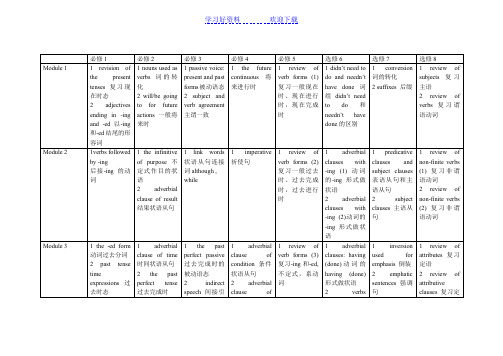
必修1 必修2 必修3 必修4 必修5 选修6 选修7 选修8Module 1 1 revision ofthe presenttenses 复习现在时态2 adjectivesending in -ingand -ed以-ing和-ed结尾的形容词1 nouns used asverbs 词的转化2 will/be goingto for futureactions 一般将来时1 passive voice:present and pastforms被动语态2 subject andverb agreement主谓一致1 the futurecontinuous 将来进行时1 review ofverb forms (1)复习一般现在时、现在进行时,现在完成时1 didn’t need todo and needn’thave done 词组didn’t needto do 和needn’t havedone的区别1 conversion词的转化2 suffixes 后缀1 review ofsubjects 复习主语2 review ofverbs 复习谓语动词Module 2 1verbs followedby -ing后接-ing的动词1 the infinitiveof purpose 不定式作目的状语2 adverbialclause of result结果状语从句1 link words状语从句连接词although ,while1 imperative祈使句1 review ofverb forms (2)复习一般过去时、过去完成时,过去进行时1 adverbialclauses with-ing (1) 动词的-ing形式做状语2 adverbialclauses with-ing (2)动词的-ing形式做状语1 predicativeclauses andsubject clauses表语从句和主语从句2 subjectclauses 主语从句1 review ofnon-finite verbs(1) 复习非谓语动词2 review ofnon-finite verbs(2) 复习非谓语动词Module 3 1 the -ed form动词过去分词2 past tensetimeexpressions 过去时态1 adverbialclause of time时间状语从句2 the pastperfect tense过去完成时1 the pastperfect passive过去完成时的被动语态2 indirectspeech 间接引1 adverbialclause ofcondition 条件状语从句2 adverbialclause of1 review ofverb forms (3)复习-ing和-ed,不定式,系动词1 adverbialclauses: having(done)动词的having (done)形式做状语2 verbs1 inversionused foremphasis 倒装2 emphaticsentences强调句1 review ofattributes 复习定语2 review ofattributiveclauses 复习定语condition 条件状语从句3 adverbialclause ofconcession 让步状语从句followed by-ing or theinfinitive withto 动词的-ing形式做宾语时与不定式的区别语从句Module 4 1 presentperfect tense 1现在完成时12 presentperfect tense 2现在完成时2 1 -ing form andthe infinitive动词的-ing 形式和动词不定式2 -ing form assubject动词-ing形式做主语1 infinitive 不定式2 but +infinitive 与but 连用的不定式1 revision ofthe passivevoice 复习被动语态2 by + -ingformby 的用法1 review of thepassive voice复习被动语态1 presentperfectprogressivetense 现在完成进行时1 adverbialclauses of time时间状语从句2 ellipses 省略1 review ofadverbials 复习状语2 review ofadverbialclauses 复习状语从句Module 5 1 degrees ofcomparison 1比较级12 degrees ofcomparison 2比较级2 1 adverbialclause of time时间状语从句2 adverbialclause of reason原因状语从句1 definingattributiveclauses 限制性定语从句2 definingattributiveclauses: ofwhom,in which限制性定语从句中of whom,1 revision ofmodal verbs复习情态动词1 review ofadverbialclauses 复习时间、条件、让步状语从句1 subjunctive(1) 虚拟语气1 v-ed form asadverbials 动词的过去分词2 phrasal verbs短语动词1 review ofnoun clauses(1) 复习名词性从句2 review ofnoun clauses(2) 复习名词性从句in whichModule 6 1 compoundwords 合成词2 the definitearticle and zeroarticle 定冠词和零冠词1 adverbs offrequency andplace 频度副词和地点副词2 adverbs andadverbialphrases 副词和副词词组1 non-definingattributiveclauses 非限制性定语从句2 contraction ofattributiveclauses定语从句的缩略形式1 may have/might havemay have/might have的用法1 review ofattributiveclauses 复习关系副词和介词+关系代词引导的限制性定语从句以及非限制性定语从句1 subjunctive(2) 虚拟语气1 subjunctive虚拟语气2 adverbialclauses ofplace, conditionand concession地点,条件,让步状语从句1 review ofmodals (1):must, can’t,may / might 复习情态动词must, can’t,may / might2 review ofmodals (2):should, could,would 复习情态动词should,could, would。
高一英语必修1MODULE1-6(外研版)同步学案

高一英语必修1(外研版)同步学案MODULE 1-6MODULE 1 My First Day at Senior High一. 教学内容:1. 怎样学好高一英语同学们刚刚从初中升入高中,相信大家都会提出这样的问题:高中和初中的英语学习方法有什么不同?在高中怎样才是正确的学习方法?这里,我为大家提几点建议。
首先,要重视基础。
这是最基本的也是最重要的。
教材内容比较多,也比较杂,同学们要全面学习,抓住基础,每一课的单词、词组、句型一定记牢。
其次是注意综合能力提高,也就是语言运用能力,死记硬背但不会做题会事倍功半,最好每天做一些英语题,提高自己的所学知识的灵活运用,而且还能在做题中扩大词汇量。
最后就是学习好英语的关键是持之以恒,日积月累。
2. MODULE 1 My First Day at Senior High二. 重难点讲解:Reading and V ocabulary1. I like Chinese because I enjoy reading stories and poems.because 和because of 区别because conj. 是一个从属连词,引导原因状语从句because of 是一个介词短语,后只能跟名词或名词短语例如:I didn‘t go there because it was raining the while day.I didn‘t go there because of rain.2. What are the main differences between Junior High school and Senior High school?difference 和different 区别difference n. 名词多用句型make the difference between A and B 分清A与B的区别different adj. 形容词多用句型A is different from B3. The teacher write on the computer , and their words appear on the screen.电脑、电视、收音机等多与介词on 搭配on TV , on the Internet , on the radio , on the phone4. We do this in a fun way, with spelling games and other activities。
高一英语教材
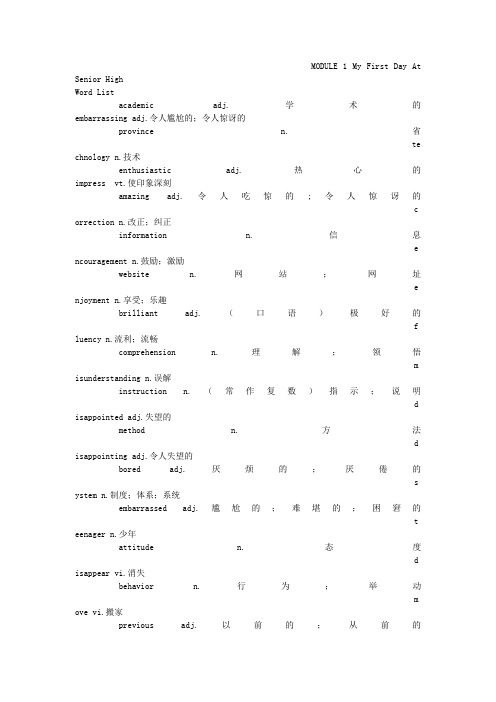
MODULE 1 My First Day At Senior HighWord Listacademic adj.学术的embarrassing adj.令人尴尬的;令人惊讶的province n.省te chnology n.技术enthusiastic adj.热心的impress vt.使印象深刻amazing adj.令人吃惊的;令人惊讶的c orrection n.改正;纠正information n.信息e ncouragement n.鼓励;激励website n.网站;网址e njoyment n.享受;乐趣brilliant adj.(口语)极好的f luency n.流利;流畅comprehension n.理解;领悟m isunderstanding n.误解instruction n.(常作复数)指示;说明d isappointed adj.失望的method n.方法d isappointing adj.令人失望的bored adj.厌烦的;厌倦的s ystem n.制度;体系;系统embarrassed adj.尴尬的;难堪的;困窘的t eenager n.少年attitude n.态度d isappear vi.消失behavior n.行为;举动m ove vi.搬家previous adj.以前的;从前的a ssistant n.助手;助理description n.记述;描述c over vt.包含amazed adj吃惊的;惊讶的d iploma n.文凭;毕业证书Phrasein other words 换句话说 look forward to 期待;盼望at the start of 在……开始的时候a t the end of 在……结束的时候go to college 上大学b e divided into 被(划)分成take part in 参加ReadingMy First Day At Senior HighMy name is Li Kang. I live in Shijiazhuang, a city not far from Beijing. It is the capital city of Hebei province. Today is my first day at Senior High school and I am writing down my thoughts about it.My new school is very good and I can see why. The teachers are very enthusiastic and friendly and the classrooms are amazing. Every room has a computer with a special screen, almost as big as a cinema screen. The teachers write on the computer, and their words appear on the screen behind them. The screensalso show photographs, text and information from websites. They are brilliant! The English class is really interesting.The teacher is a very enthusiastic woman called Ms Shen. We are using a new textbook andMs shen’s method of teaching is nothing like that of the teachers at my Junior High school. She thinks that reading comprehension is important, but we speak a lot in class, too. And we have fun I don’t think I will be bored in Ms Shen’s class! Today we introduced ourselves to each other. We did this in groups. Some students were embarrassed at first but everyone was friendlyand it was really nice. Ms Shen gave us introductions and then we worked by ourselves. Ms Shen wants to help us improve our spelling and handwriting. We do this in a fun way ,with spelling games and other activities. I like her attitude very much, and the behaviour of the other students shows that they like her ,too. The are sixty-five students in my class---more than my previous class in Junior High. ? of them are girls. In other words, there are three times as many girls as boys, but in this class, everyone is hard-working. For our homework tonight,we have to write a description of the street where we live. I am looking forward to doing it!Question:1 Lines 21-24:Ms Shen’s method of teaching is nothing like that of the teachers at my Junior High school.(a) My previous teachers’method of teaching is better than that of Ms Shen.(b) My previous teachers’ method of teaching is different from that of Ms Shen.2 Lines 27-28:I don’t think I will be bored in Ms Shen’s class!(a)I will find the class interesting! (b) I will find the class difficult!3 Lines 31-32:Some students were embarrassed at first…...(a)The students stopped being shy eventually.(b)The students couldn’t do the activity.4 Lines 33-35:Ms Shen gave us instructions and then we worked by ourselves.(a)We did everything by ourselves.(b)We listened to Ms Shen’s explanation and then worked with each other. Grammar 1 : Revision of the present tenses.1 Which verbs are in the present simple tense?A I live in Shijiazhuang, a city not far from Beijing.B We are using a new textbookC The teachers write on the computer, and their words appear on the screen behind them.D I am writing down my thoughts about it.2 Which uses of the present simple tense are they examples of ?indicating a habit, or something you do regularly.indicating something which is always true.(e.g.scientific facts)3 The verbs in other two sentences are in the present continuous tense. Whichindicating that something is taking place at this moment.indicating that something is taking place in this period of time(e.g. thismonth, this term, this year )Grammar 2: adjectives ending in –ing and -edThe –ing form describes things;the –ed form describes people.The –ing form describes the people or things that cause the feeling: the–Everyday EnglishRead this part of the conversation between Rob and Diane. Look for the expression they use to keep the conversation going and underline them.Rob:Hi,DianeDiane:Hi Rob!How are you doing?Rob:I’m fine. I’ve just been to my first language class.Diane:Oh really? So have I. Which Language are you studying?Rob: ChineseDiane:Is that right? Cool!How was it?Rob:There’s an assistant teacher called Miss Wang. She’s Chinese. We are going to see her once a week.Diane: And what do you think …?Culture cornerRead the letter from a Senior High student in the US. What’s different in the American and Chinese school systems?A LETTER from a Senior High StudentDear Li Kang,How’s it going? I thought I’d write to tell you about the American school system. Secondary school in the US usually covers seven years,grades six to twelve. Ninth to twelfth grades are high school. At the end of twelfth grade, American students receive the high school diploma. Students need a high school diploma if they want to go to college.The school year is divided into two semesters ,the first of which is September through December,and the secondary January through May. We have a LONG summer vacation!We start school at 7:50 am and we finish at 3 pm.I take part in all kinds of after-school activities–I play football,basketball,volleyball,table tennis and I go to theater club.Will you tell me something about your summer vacation and the Chinese school system in your next letter?Best wishes,Rob MarshallMODULE 2 My New Teachers Word listamusing adj.有趣的;可笑的 loudly adv.大声的 energetic adj. 精力充沛的wave vt.挥(手);招(手)intelligent adj.聪明的joke n.玩笑;笑话nervous adj.紧张的;焦虑的summary n.总结;摘要;提要organised adj.有组织的;有系统的respect vt&n.尊敬;尊重patient adj.耐心的grade n.(美)成绩;分数serious adj. 严肃的headmast er n.女校长shy adj.害羞的;羞怯的period n.一段时间strict adj.严格的;严厉的revisionn.复习impression n. 印象translat ion n.翻译avoid vt.(故意)避免timetabl e n.时间表hate vt.讨厌;不喜欢topic n.话题;题目incorrectly adv.不正确地vacation n.假期completely adv.十分地;完全地revise vt.温习(功课)immediately adv.立刻;立即discipli ne n.纪律appreciate vt.感激relation ship n.关系admit vt.承认 formal adj.正式的scientific adj.科学的 relaxed adj.轻松的;松懈的;宽松的literature n.文学 similarly adv.同样地;类似地Phrasemake sure 确定;确信;查明;弄清楚 so that (引起表示结果的从句)因此make progress 取得进步 as a result 结果in fact 事实上 fall asleep睡着tell jokes 讲笑话;开玩笑ReadingMy New TeachersThey say that first impression are very important. My first impression of Mrs Li was that she was nervous and shy. I think perhaps she was ,as it was her first lesson with us. But mow, after two weeks, the class really likes working with her. She is kind and patient, and she explains English grammar so clearly that everyone can understand it!- She avoids making you feel stupid!I’ve always hated making mistakes or pronouncing a word incorrectly. When I speak English ,but Mrs Li just smiles, so that you don’t feel completely stupid!I think maybe she goes a bit too slowly for the faster students, but for me it’s wonderful!I feel I am going to making progress with her.I’d guess that Mrs Chen is almost sixty. She is very strict.-We don’t dareto say a word unless she asks us to. She is also very serious and doesn’t smilemuch. When she asks you to do something, you do it immediately!There are a fewstudents in our class who keep coming to class late but they are always on time forMrs Chen’s lessons!Some of our class don’t like her, but most of us reallyappreciate her because her teaching is so well organized and clear. And a few studentseven admit liking her!During scientific experiments ,she explainsexactly what is happening and as a result my work is improving. Physics will neverbe my favorite lesson, but I think that I’ll do well in the exam with Mrs Chenteaching me.Mr Wu’s only been teaching us for two weeks and he’s already very popular.I think this is because he really enjoys teaching Chinese Literature – He lovesit, in fact!He’s got so much energy, this is one class you do not fall asleep in!He’s about 28,I think, and is rather good looking. He talks loudly and fast, andwaves his hands about a lot when he gets excited. He is really amusing and tellsjokes when he thinks we’re getting bored. Even things like compositions andsummaries are fun with Mr Wu. I respect him a lot.QuestionComplete the sentences. Use these words. Change the form where necessary.admit appreciate avoid hatejokeliterature respect scientific summary1、 The young man ( ) that he stole the money.2 、I love reading good( ).3、 Thank you so much. I really( ) your help.4、 It’s a very interesting ( ) equipment.5 、I being ( ) late for school6、 Write a ( ) of this text. Use about 100 words.7 、I try to ( ) boring people.8 、I( ) you because you work hard and are a good person.9、 That ( ) was very amusing.Find words and phase in My New Teachers that match the definitions below.1、how someone seems to you the first time you meet them. ( )2 、in the wrong way. (3、 be brave enough to do something. (4 、move your hand through the air. (5 、handsome. (Grammar verbs followed by –ingComplete the sentences with words from the box. There may be more than one answer.Chang the form where necessary.admit avoid consider dislike enjoy finish hate keepimagine like love practice stop suggest1、 The student () copying from other students。
正在进行时复习课课件
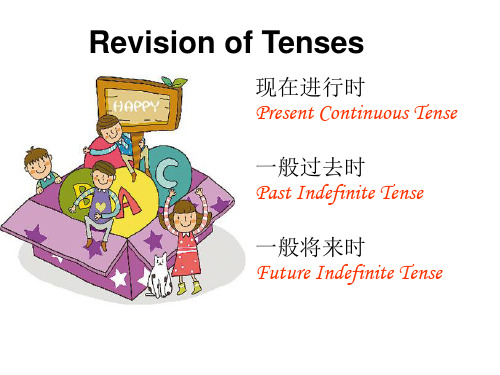
run- running swim- swimming ________ sit- _________ sitting shop-_________ shopping
1、一般情况下直接在动词原形后加ing。
2、末尾是不发音的e结尾的动词要去e加ing。 3、部分动词需双写末尾再加ing。如,run-running。
Revision of Tenses
现在进行时 Present Continuous Tense 一般过去时 Past Indefinite Tense 一般将来时 Future Indefinite Tense
Revision of Tenses
• 现在进行时 • Present Continuous Tense
doing the dishes/… going fishing/… washing the clothes/… playing the piano/… writing a plan/… taking pictures anweringthe phone
write
taking take answer answering
Dialogue showing
Panda is doing Kungfu now. Can you discribe ?
It’s a sunny day, Panda gets to a nature park….
Imagine that you were in a nature park. What are you doing? (请写下来并phone call to Tiger!
Listen and fill in the blanks T: Hello! P: Hi. ______Panda. What are you doing?
时态复习课件(共19张PPT)
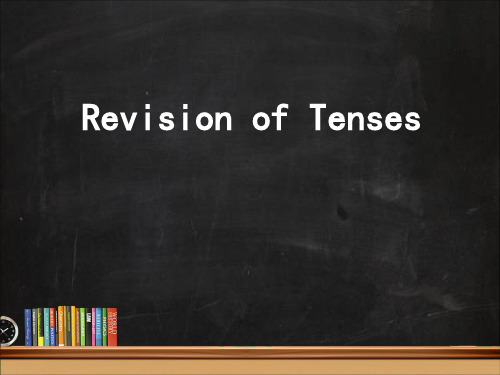
六、现在完成时 (Present Perfect Tense)
是过去的动作或状态持续到现在并且已经完成,对现在造成的影 响,可能持续发生下去
1. I __h_a_v_e_s_tu_d_i_e_d_ (study) in the school since 2009. 2. Tom _h_a_s_li_v_ed__(live) in Beijing for two years.
Revision of Tenses
英语常见时态汇总:
1. 一般现在时 (Simple Present Tense) 2. 一般过去式 (Simple Past Tense) 3. 一般将来时 (Simple Future Tense) 4. 现在进行时 (Present Continuous Tense) 5. 过去进行时 (Past Contunuous Tense) 6. 现在完成时 (Present Perfect Tense)
结构: 主三动三,非三动原
三、一般过去时 (Simple Past Tense)
表示过去的动作或状态
1. I ___m_et_ (meet) him in the street yesterday. 2. His uncle _w_e_n_t _ (go) to Beijing last week. 3. We _w_e_r_e_ (be) at home just now.
_T_h__e_f_il_m__h__a_s_b__e_e_n__o_n__fo_r__1_0__m_i_n_u_t_e_s_.____
短暂性动词可以用于现在完成 时,但不可与表示一段时间的 时间状语连用,需要转换成延 续性动词或词组。
Revision of the verb tenses-01导学案2
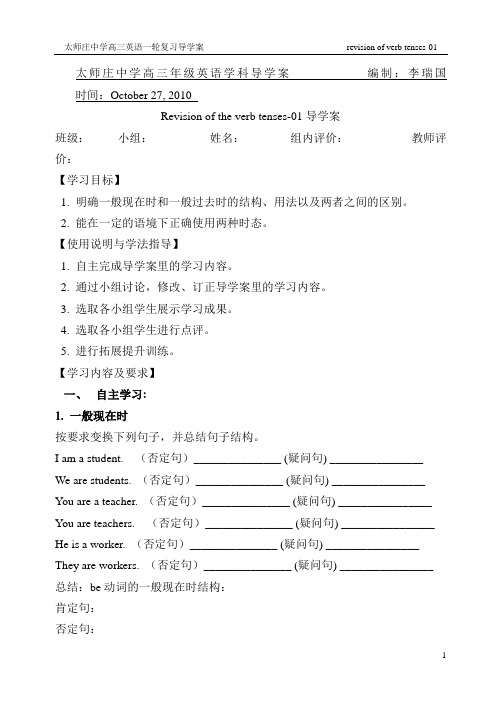
太师庄中学高三年级英语学科导学案编制:李瑞国时间:October 27, 2010Revision of the verb tenses-01导学案班级:小组:姓名:组内评价:教师评价:【学习目标】1. 明确一般现在时和一般过去时的结构、用法以及两者之间的区别。
2. 能在一定的语境下正确使用两种时态。
【使用说明与学法指导】1. 自主完成导学案里的学习内容。
2. 通过小组讨论,修改、订正导学案里的学习内容。
3. 选取各小组学生展示学习成果。
4. 选取各小组学生进行点评。
5. 进行拓展提升训练。
【学习内容及要求】一、自主学习:1. 一般现在时按要求变换下列句子,并总结句子结构。
I am a student. (否定句)_______________ (疑问句) ________________ We are students. (否定句)_______________ (疑问句) ________________Y ou are a teacher. (否定句)_______________ (疑问句) ________________ Y ou are teachers. (否定句)_______________ (疑问句) ________________ He is a worker. (否定句)_______________ (疑问句) ________________ They are workers. (否定句)_______________ (疑问句) ________________ 总结:be动词的一般现在时结构:肯定句:否定句:一般疑问句:I get up at five every day. (否定句)_______________ (疑问句) ________________We do our homework every day. (否定句)_______________ (疑问句) ________________Y ou go to school at six every morning.(否定句)_________________________ (疑问句) __________________________He goes to the cinema every week.(否定句)__________________________ (疑问句) __________________________They go to the park every Sunday.(否定句)_______________________ (疑问句) ___________________________总结:一般现在时表示___________________________________________________实意动词的一般现在时结构:肯定句:否定句:一般疑问句:2. 一般过去时按要求变换下列句子,并总结句子结构。
Revision of tense(8)
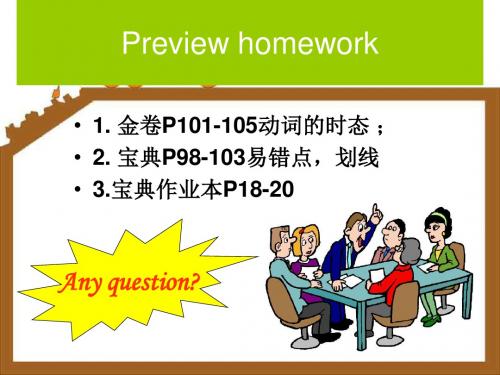
【例2】(2008年河北省中考试题) ---Please bring your homework to school tomorrow, Steven. ---OK. I _________. A. will B. won't C. do D. don't
解析:在对英语肯定祈使句的应答中,我们常使用一般将来时。
也就是Yes, I will.表示肯定答复;同理,对于Please don’t do sth 的回答,我们的应答常是Sorry, I won’t.
【拓展1】
中考中,专门考查will +动词原形或be going to +动词原 形的试题并不多。我们来盘点一下考查一般将来时的主 要地方:
Preview homework
• 1. 金卷P101-105动词的时态 ; • 2. 宝典P98-103易错点,划线 • 3.宝典作业本P18-20
Any question?
Tenses 动词时态
No sweet without sweat.
动词时态是中考的主要考查点。动词的常见时态有八种: 一般现在时;一般过去时;现在进行时,过去进行时, 一般将来时,现在完成时。另外,在一些特定场合,也 会对过去完成时,过去将来时进行考查。
ago. A. has gone to, went B. has gone to, has been C. has been to. went D. has been to, has gone
解析: 考查一般过去时,离不开现在完成时的语境。看 这道中考试题,表示“去了某地”时,我们要使
用has gone to 来进行表达;表示说话人尚未回到说话地; 在第二句中,有ago的提示,我们可以知道应该使用一般 过去时;
(完整)外研高中英语教材语法顺序表
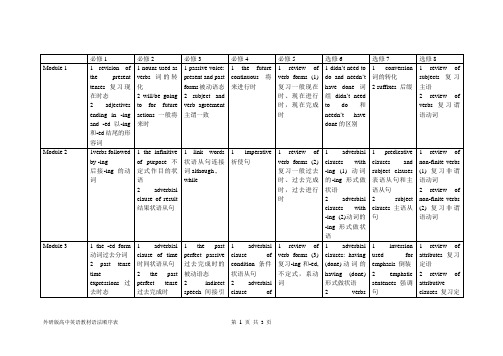
Moduபைடு நூலகம்e 6
1 compound words合成词
2 the definite article and zero article定冠词和零冠词
1 adverbs of frequency and place频度副词和地点副词
2 adverbs and adverbial phrases副词和副词词组
1 passive voice: present and past forms被动语态
2 subject and verb agreement主谓一致
1 the future continuous将来进行时
1 review of verb forms (1)复习一般现在时、现在进行时,现在完成时
1 didn’t need to do and needn’t have done词组didn’t need to do和needn’t have done的区别
1 subjunctive (2)虚拟语气
1 subjunctive虚拟语气
2 adverbial clauses of place, condition and concession地点,条件,让步状语从句
1 review of modals (1): must, can’t, may / might复习情态动词must, can’t, may / might
1 non-defining attributive clauses非限制性定语从句
2 contraction of attributive clauses定语从句的缩略形式
1 may have/ might have
Period 3 Grammar1 Revision of the present tenses

Grammar1 Revision of the present tenses
学习目标
Learning goals:
1.复习一般现在时且掌握一般 现在时与现在进行时的区别 2.能够准确使用两种时态。
合作探究
内 【探究一】:选择题; 容 【探究二】根据句子总结现在进行时的使用规则 . 要 1.小组长做好调控,先一对一,再组内大讨论。 求 2. 组长协调本组讨论内容及进度,保证高效完成。 3. 组长安排组员A层做好点评、拓展, B层展示并帮 助C层解决问题。 目 A层解决所有问题,及时帮助B层并拓展 标 B层解决所有问题并帮助C层 C层解决至少80%的问题
Let me try!
展示答案 【探究一】:选择题 BCACB BBBCC CDCCB 【探究二】根据句子总结现在进行时的使用 规则。 ◆We are having an English class now. 表示说话时正在进行的动作 ◆They are flying to Beijing next week. 表示即将发生的或按计划安 go/come/start/leave/return/arrive/stay/fly 等表示运动方向的动词,句中往往有表示 将来的时间状语
◆She is always finding fault with others. 表示反复发生的动作 (常与 always/forever/constantly/all the time 等连用,表反复发生或习惯性的动作, 常表示不满、抱怨或赞赏等情感) ◆He is translating a book. 表示现阶段正在进行的动作,虽然此时 此刻这一动作不一定正在进行
展示点评分工
任务 【探究一】1---5
【探究一】6---10
2018高考英语大一轮温习 Module 1 My First Day at Senior High讲义 外研版必修1
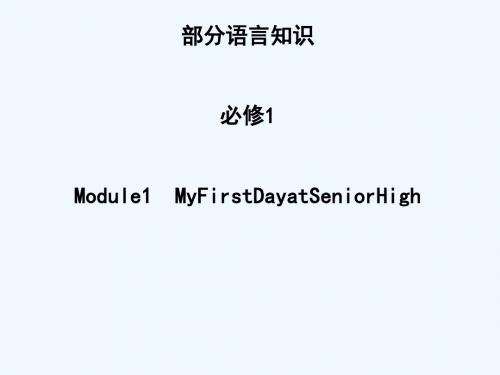
英文典例: ①In other words, gossip is satisfying because it gives
people a sense of belonging or even superiority. (2016浙江,阅读理解A)
换句话说,说闲话让人满足,因为它带给人们归属感,甚至是优越感。 ②“Did you enjoy the film?”“ In a word —no”.
“你喜欢这部电影吗?”“一句话,不喜欢。”(朗文P2292)
③We’re not going to read every bit of it word for word. 我们不用从头至尾一个字一个字地读。
【巧学助记】
6.be divided into 被(划)分成……
归纳 拓展
①divide...into...把……分成……
7. at the end of 在……结束的时候
8.go to college 上大学
1.In other words,there are three times as many .
girls as boys.
换句话说,女生人数是男生的三倍。
句 2.—...I’ve just been to my first language class.
英文典例: ① Follow the instructions printed on the back of the box.
按照印在盒子背面的说明去做。 ②Under Stewart’s instruction,I slowly mastered the art of
glass blowing. 在斯图尔特的教导下,我逐渐学会了玻璃吹制技术。(朗文P1018) ③Our staff have been instructed to offer you every assistance. 我方工作人员已奉命为您提供一切帮助。 特别提示:①instruction的基本意思是“命令,指示”,多用复数形式, 常可接动词不定式或that从句作定语或同位语。 ②instruction也可作“讲授,指导,教学”讲,为不可数名词,其后常与 介词in搭配使用。 ③复数名词instructions表示“操作指南,用法说明”,其后常接由介词 on,for或about引起的短语。
冀教版九年级英语下册 Unit2 Revision教学设计

冀教版九年级英语下册 Unit2 Revision教学设计【设计思路】主题为语言学习和课程育人提供语境范畴,它渗透、贯穿于文本的全部内容。
学生对主题意义的探究直接影响学生语篇理解的程度、思维发展的水平和语言学习的成效。
在单元主题语境中,能够通过中西文化的比较,构建多元文化视角,树立语言教学和文化学习相互促进、相互渗透的意识,吸收中外文化精华,自觉传播和弘扬中华优秀文化。
本节课整合了九年级教材的相关内容,并且增加了一个同主题的阅读材料,将主题意义进行深度挖掘和升华。
【教材分析和学情分析】本课作为九下第二单元“Great people”的复习课时,在明确了主题意义之后,制订单元整体教学目标,根据实际教学需要设计拓展主题意义的教学活动,以促成学生各项能力的综合进阶式发展。
最后,利用单元整体教学输出活动,使学生完成对主题意义的深度理解和个性化表达。
九年级教材文本中出现的名人较多,如:艺术家谭盾、Audrey Hepburn、成龙,宇航员Neil Armstrong,科学家Marie Curie,袁隆平等,课上利用各种形式一一呈现,从古今中外、相同职业等角度,带领学生梳理人物,去挖掘人物的出身、兴趣、教育、理想、成就、性格、品质等方方面面,最终明白一个人的成功不是偶然的,是多种因素综合作用的结果。
初三学生的认知能力和思维的深度、广度较初一初二都有明显提高。
人物传记类文本的解读基本遵循Who? What? Why?展开教学,最终让学生明白心怀大爱,乐于奉献的人才会被世人所称颂和景仰。
崇拜偶像的意义就是努力向他(她)靠近,成为更好的自己。
【教学目标】1.能简述相关名人的个人经历、主要成就等信息;2.能根据相关名人的事迹概括人物品质;3.能合情合理地表达对相关名人的崇拜并行文。
【教学重难点】1.简述相关名人时能抓住重要信息介绍;2.概括人物品质时用词精准;3.写作时注意运用正确的时态描述。
【教学过程设计】Step One Lead-in & Word-revisionThe six famous people in the Welcome to the unit part T: Who are they? What did they do? What can we learn from them?1. Review some new words in this unit like nationality, people, jobs …2. Read and summarize: pioneering spirit, strong will, courage, wisdom, hard work …【设计意图】通过第一课时六位名人导入,复习本单元的重点词汇;结合语篇内容,挖掘人物身上的优秀品质,想一想:What can we learn fromthem? 同主题文章在词汇、话题、体裁等方面体现出一定的相似性,学生能更好地举一反三,实现知识的迁移。
begin-began-begun-beginning

Unit 6Teaching aims and demands:Grammer: Revision of verb tensesFunctional Items: LocationImportant and difficult points:Functional Items: Location. How to express the address.Grammer: The Present Indefinite TenseThe Present Continuous TenseThe Future Indefinite TenseThe Past Indefinite TenseThe Present Perfect TenseIdealogical education: Love our motherland.Be polite.Important and difficult points:1.beginv. begin—began—begun—beginningbegin+n.He is going to begin a new business.他将开发新事业.Let’s begin today’s lesson at Chapter 3.今天的课程从第三章开始.begin to do/doingShe began to cry/crying.他开始哭了起来.Note: begin to do与begin doing在意思上几乎没有差别,但是:①表长期性,习惯性行为的开始,多用doingHow old were you when you began practicing the piano?你几岁开始学钢琴?②主语不是人,多用to doThe snow began to melt.雪开始融化.The water is beginning to boil.水逐渐沸腾起来.③后接understand或feel等表示感觉或精神活动的动词,用以指心理状态和思维活动的开始,多用to doI’m beginning to understand.我逐渐明白了.I was beginning to think you'd never come.我开始意识到你永远不会来了.④begin和start的进行时态之后,一般不用动词的ing形式He began/started crying./to cry.他哭起来了.It’s starting /beginning to rain.下起雨来了.begin和start用法相同,口语常用start课本: begin with从…开始,先做某事We’ll begin with you.我们先从你开始.⑴以…开始Knowledge begins with practice.认识从实践开始.The ocean began with little drops of water.大洋是点滴的水汇成的.⑵先(从某事做起)Which lesson shall I begin with?我先从哪一课讲起?Begin with this room and do the others afterwards.先打扫这一间,然后再打扫其他几间.Let us begin with this song.咱门先唱这首歌.Note: to begin with首先,开始时To begin with, may I introduce to you Mr. Li of our corporation?首先,让我给你介绍我们公司的李先生.To begin with, they had little support, but later on people began to rally to them.开始时支持他们的人很少,但后来人们开始聚集到他们那边去了.n. beginning①first+part开始的部分→endin the beginning of this century这个世纪初I missed the beginning of the film.我没看到影片的开头.A good beginning makes a good ending.有的开始才有好的结果.②starting-point起点Many big businesses start from small beginnings.许多大企业都是从小企业起步的.③from beginning to end 〔adv.〕从头到尾I’ve read the book from beginning to end.我把这本书从头到尾看完了.I know the story from beginning to end.我彻底了解这个故事.④from the beginning 〔adv.〕从一开始Recite the poem (right) from the (very) beginning. 从头开始背这首诗.⑤in (at) the beginning 〔adv.〕最初,起初the beginning of term学期开始2.Please tell me your names, and say where you live.①tell sb. sth.告诉某人某事Please tell me your address.请告诉我你的住址.②tell sb. to do sth.用以表命令或指示Tell him to wait for us at the gate.让他在大门口等我们.③tell the truth说实话To tell the truth, I’m not very interested in going to theshow.说实话,我不太想去看演出.④A: say vt. Say的直接宾语通常是所说的话.He sat in a corner and said nothing all evening.他坐在角落里,整夜一句话也没说.Tell vt. tell直接宾语通常是提供的信息,间接宾语是接受信息的人.She told me nothing about herself.他没向我透露他个人的情况.B: say多用以表达出直接引语He said,“I’m a student.”C: say和tell多用以表达间接引语,tell后面一般须有一表示人的直接宾语,而say后则无.He hasn’t told me that he’s leaving.=He hasn’t said that he’s leaving.D: speak与talk vt./vi.speak常用以指一人讲大家听,talk指两人或两人以相互交谈We talked for hours about the meaning of life.我们谈人生的意义谈了几个小时.He spoke to the class about the dangers of smoking.他给班上学生讲了吸烟的危害性.E: speak+语言He speaks English in class.他上课说英语.3.I live at 320 Xinjiekou, in Xincheng District.live at/in 居住在4.would like to = would love to5.be sick = be ill]He is a sick man. (√) sick可作定语He is a ill man. (×) ill不可作定语6.from now on从今以后I’ll be more careful from now on.从今以后我会更加小心.7.welcome①welcome to sp. (interj.)谈词Welcome to Beijing.欢迎光临北京.②welcome + n. vt. 高兴迎接,欢迎(人)He welcome his friends to his home.他欢迎朋友到他家.③welcome sth. vt. 欣然接受(意见等)He will welcome our suggestion.他会欣然接受我们的提议.④be welcome to do受高兴/欢迎做某事You’re welcome to visit my home when you have t ime.你有时间去我家,你将受到欢迎的.8.wait a moment等会儿wait for等待Lesson2Important and difficult points:1.as quickly as you can尽可能快=as quickly as possible2.put up your hand(s)举手=raise your hands3. A. get ready for sth./be ready for sth.We’re getting ready for the dinner.强调动作We’re ready for the dinner.强调状态B. get ready to do sth./be ready to do sth.I’m ready to go.我已准备出发了.C. be ready to do =willing愿意(欣然)作某事不放在名词前I’m ready to go.我已准备出发了.D. be ready to do眼看着就要…,快要…的不放在名词前The girl was ready to burst into tears.那小女孩快要大哭起来了.E. get /make…ready准备…She is getting dinner ready.她正准备做晚餐.4.meet met met meetingmeet sb.通常不用被动语态会面,会见,偶然相遇I happened to meet him in the cinema.我正巧在剧院遇见他.We met each other at the station.我们两个人在火车站碰面.5.Please make sure everything is ready.①be sure of/about + n.He is sure of success.他深信自己会成功.=He is sure that he will succeed.②be sure that确信…We are sure that he is ill.=We are sure of his illness.我们确信他病了.③be sure to do必然…的,一定会…的He is sure to call you.他准会给你打电话.④make sure of/that确定,查明,弄明白.(肯定没法做到)Will you make sure of his return?=Will you make sure (that) he returned?请你查明他是否真的回来了,好吗?sure,表示没有疑问而“确定的,确信的”之意的一般用语,表示的是对事实的主观确信.certain,表示“确定的”则是根据客观的事实或证据.ter that day Mr. Liu…①later on后来,以后→ earlier onYou will find the book instructive later on.你以后将会发现那本书的好处.a few days later on几天后②sooner or later早晚,总有一天7.①raise vi.举起,升起,扬起,抬起When I entered his office, he didn’t raise his head from his desk.我走进他的办公室时,他头都没抬起来.The box is too heavy, I can’t raise it.这盒子太沉,我抬不动它.②rise rose risen⑴to go up升高,升起 v.→fallThe river is rising after the rains.雨后河水涨了.He voice rose higher and higher with excitement.她的嗓门因激动越来越大.The price of bread has risen by15%.面包的价格上涨了15%.⑵(太阳,月亮,星星)升起→setThe sun rises in the east.太阳从东方升起.Note:①rise vi.“上升到更高的位置”raise vt.使某人或某物升到更高的位置They raise the curtain and the play began.他们拉起了幕布,戏就开始了.The curtain rose and the play began.幕布升起,戏就开始.African AfricaAsian AsiaEuropean Europe8表位置:in内 to外 on接壤①Tianjin is in the north of China.②Japan is to the north of China.③India is on the southwest of China.9Revison of verb tenses.a)The Present Indefinite Tense一般过去时主语第一人称主语+原形+其他 I go to work.Do+主语+原形+其他? Do you go to work?主语第三人称主语+动词单三+其他 He goes to work.Does+主语+原形+其他 Does he go towork?b)The Present Continnous Tence.现在进行时主语+be+动词-ing+其他He is writing.Be+主语+动词-ing+其他?Is he writing?c)The Future Indefinite Tense一般将来时主语+shall/will+原形+其他I will go.Shall/Will+主语+原形+其他Shall I/Will you go?d)The Present Perfect Tence现在完成时主语+have/has+done+其他I have been there.Have/Has+主语+done+其他Have you been there?Exercise:1.The population of China is larger that __.A GermanyB the one of GermanyC that of GermanyD Germany’s one人口之间比较2.Ningxia lies __ the north of China.Chongqing is __ the west of Hubei.Unit 2 The visitorTeaching aims and demands:Grammar: Revising the InfinitiveFunctional Items: Visiting places/peopleImportant and difficult points:Functional Items: People and nationGrammar: The usage of the InfinitiveIdealogical education: Learn some knowledgeabout other countries and be pol i te.Lesson 5Important and difficult points:1. happen: take place vi.无被动①偶然的发生How did the accident happen?事故怎么发生的?②happen to sb./sth.发生于…身上,成为某人/物的体验或命运She hoped nothing bad would happen to him.她希望不会有坏事发生在他身上.What’s happened to my clothes?Do you know where they are?我的衣服到哪里去了?③happen to do碰巧(偶然)不能用进行时I happened to see him on the street.我碰巧在街上见到他.I happened to be there when the fire started.火灾发生时我碰巧在那.④it (s o) happens+that…碰巧…It so happened that the famous actor was her brother.=The famous actor happened to be her brother.那个有名的演员碰巧是她的哥哥.⑤happen upon/on vt.偶然发现(不可用被动)I happened on just the thing I’d been looking for.我偶然发现了我一直在寻找的东西.Note: take place指的事情是有计划的The sports meeting took place on 24 April at 6.am.运动会正于4月24日上午6时举行.Happen指偶然发生的=occur 后者文雅些2.She’s a lady from Canada.=She’s a Canadian lady.lady=be polite way to woman3.The lady from Canada…=The Canadian lady…4.What time is she arriving?用现在进行时表将来,动词为表位置移动的.如,come, go, arrive, stay, leave, do, start, travel, drive, fly, happen等The bus is coming.汽车来了.(一看见车了)The bus will come.汽车会来的,快来了.(未看见车)5.She is on an exchange programme.①an exchange programme=It’s a way for people to visit other countries.交流计划,交换项目AFS is an exchange programme. AFS是一个交流计划②on: a member of…我为某组织的成员(A.E.)in (B. E.)Wei Hua may be on the team.③be on处于…状态be on a visit to sp.=visit sp.be on business出差be on duty值日be on holiday度假be on sick leave歇病假6.learn learnt learnt/learned learned①learn sth. from sb./sth.学习,学Y ou must learn from your mistakes.你必须从错误中学得经验.②learn of/about sth. 获悉,得知,认识到I’m sorry to learn of/about your illness.听说你病了,我十分难过.We learned the truth about the matter at last.我们终于得知那件事的真相.③learn of 了解(听)到…的消息I learned of her illness from hi m.我从他那里得知她生病了.④learn one’s lesson汲取教训I’ll never do that again, I’ve learned my lesson.我再也不做那种事了,我已有了教训.⑤Live and learn. 活到老学到老.learn from past mistakes to avoi d future ones.惩前毖后.7. while conj. 当…时候,和…同时;只要…①He fell asleep while (he was) doing his homework.他做着功课就睡着了.He watched TV while (he was) eati ng.他边吃边看电视.Y ou’ll want for nothing while I am alive.只要我活着,你就不会缺任何东西.Note: while所引导的从句与主句主语相同,且while从句的动词为be动词时,while从句的主语和be动词常被省略.②虽然,然而I earn only 50 dollars a week, while she earns 80 dollars.我一星期只赚50美元,而她却赚80美元.③一套…after a while 不久,一会儿(adv.)Note: while引导的时间状语从句多用进行时,如用一般时则为延续行动词.8.But I met a/an … once.因为met为一般过去时,once为“曾经,从前”,如用完成时,once为“一次”9. see a lesson 听课have a lesson 上课10.She is coming to see our English lesson.Infinitive used as purpose attributiveThey want to learn about each other’s countries.Infinitive used as object.vi. + to do 不定式为目的状语vt. + to do 不定式为宾语11. as part of 作为…一部分part of …的一部分一般part前不加冠词,如加也加a①Taiwan is part of China.台湾是中国的一部分.②Only part of this story is true.这个故事只有一部分是真实的.12.The Canadian teacher has come to see what life in Chi na i s li ke.see what life in sp. is l i ke 看看某地的生活是什么样子①I have never seen John. What is he like?我从没见过约翰.他是什么样子?②Tell me what her life is like.给我讲讲她的生活是什么样子.③I want to know what it is like in the water.我想知道在水里是什么感觉.What life in … is like?=How do the people in … live?Unit 3 The new teacherImportant and difficult points1 at the sports meting2 by the timeeg. But by the time I arrived she had already gone.3 think ofeg. Think of some words instead of "she"in the form.4 intead ofeg. She had some bread instead of the dinner.5 make one's bedeg. She made her bed after getting up.6 get dressedeg. She have got dressed.7 comb one's haireg. She is combing her hair.8 get sth. readyeg. She is getting breakfast ready.9 oneg. His wdding fell on a Wendnesday.On a cold winter morning, I saw the old man walking slowly to the village inn.10 Follw me, please!11 For a moment I felt afraid.feel +adj.I am not feeling very well today but there is a lot of work for me.The whole family felt worried about him.12 I said as loudly as I could.as+adj.+as one canShe tried as hard as she could.He typed as fast as he could.We can't go any farther. This is as far as we go.as+adj.+as possibleWe plan to stay as long as possible.You should use English as often as possible.Please come as soon as possible.13 for a momentFor a moment I felt afraid.14 take offWho took the map off the wall.For every five minutes there is a plane taking off.The plane took off on time.He took off his wet shoes.15 The class went quiet.go=grow=become=turn=getHer face turned /grew red.His har went /grew/became grey quickly.Most leaves turn/grow/go/become yellow in the fall.He become /got more and more interested in the topic.The milk turned sour.16 as+time+go byAs years went by, he came to understand why his father had done that.As days go by, the buds are going through hair.17 hear/see/feel/watch/look at/listen to /notice--- doing/doI saw Jane playing volleyball just now.I saw Tom pack his school bag and went out.The cat angrily watched the bird flying above its head.The cat watched the birds fly away.18 find+O+n.I found his sister a quiet girl.find +O+prep. phraseI found the book alresdy on my desk.find+O+adj.He was shocked to find his door wide open.find +O+-ingHe found her learning to cook.find +O+P.PHe wasangry to have found the work still undone.find it +adj.+to doHe found it easy to learn to drive a car.19 stop doing /stop to doEverybody stopped laughing.Everybody stopped to laugh.20 be able toWe shall be able to finish the work tomorrow.He has not been able to come.21 failHis eyesight is failing.He is very old and failing quickly.He failed in the exam.22 at the age ofI had been ill at the age of nine months.23 give sb. a placeHe found a place in a big store.He told me he needed a place in the hospital near his home. Unit 4 The seagulls of Salt Lake CityImportant and difficult points1 nameWhat's your name?The boy named Liming stood there.2 At that time, a group of people arrived at a valley-----at that timea group of3 be far ( away) from---be----- away fromThe school is three mile away.Your birthday is two weeks away.4 lie iay lain lyingHe enjoys lying on the beach and having sunshine.Snow lay thick on the ground.The town lies near the sea.That's where the danger lies.5 have to doI have to see hime and talk it over with hime.We shall to have to help them as much as we can.6 sth.+adj+to doI'll show you something interesting.The teacher asked us to think of something different.He said he had something important to tell me.7 more and moreThe sky is growing darker and darker. A storm is coming.The ice becomes smaller and smaller. In the end only water is left.The film is getting more and more exciting.8 go upTheir sprits went up.His blood went up.They are going up to the top of the mountain.Price are going up.The temperatur has gone up.She dicided to go up to Beijing.9 in no time=vey quicklyYou'll be all right in no time.No problem! He can learn it in no time.10 anotherThis shirt is to tight for me. Show me another.To say is one thing and to do is another.11 to one's surpriseTo our suriprise, he wone the game.12 not--- butThey saw not locusts but seagulls.He is interested not in science but in art and music.13 in a short time=in a short while14upHe was so hungry that he ate up everything in a minute.The fire will soon burn up the building.I've used up all the money.He paid up all his debts.15 in fullWrite out the answers in full.Unit5 How's the family?Important and difficult points1 too---toNever too old to learn.What he told me was too good to be true.The child is too young to go to school.The water is too dirty to drink.2 What a fine voice she has!What great news it is!How fast he is driving!How I hate these people!3 She is Bruce's aunt.Zhang's telephone numberher sister-in-law's friendthe students' reading room4 will/shall+doI will/shall take part in a dinner party tomorrow evening.The children will not feel lonely. They will play together.be going to doNext week Lucy is going to have a party.Who is going to try first?5 It's only a 20-minute drive from my home to my school.It's only 5-minute bicycle ride from my office.It's not far. It's only a 20-minute walk. Let's go on foot.6 mind+clauseIdon't mind whether he goes there or not.Do you mind if I smoke here?mind+doingWould you mind opening the door?Would you mind my smoking here?7 as long as =on condition thatYou can go ther , as long as you come back befor dark.Any book will do as long as it is interesting.As/so long as =sinceAs long as you're not busy, could you help me with this work?8 even ifThey'll help you even if you don't succeed.Even if he studies hard , he won't pass the exam.9 be troubleThey're also less trouble.I don't want to be a trouble to you.10 the sameThe school is still the same as it was fifty years. The two balls reached the ground at the same time.11 slow downThe train slowed down and came to a stop.Slown down. I can't quite catch you.12 What is ---like? /What does ----like?What is he like? I've never seen him before.What is it like in the water?13 at times = sometimesTom goes to the library to borrow books at times.We have fish for dinner at times.14 He did come last night.I do like this picture.Do be careful!Unit6 Mainly revision Important and difficult points1mayThe radio says that it may rain later.May I borroe your book?2 help ---with /help ---to doAnother doctor came to help him with the operation.I helped my mother with supper.3get inShe went out to get the washing in.They're busy getting in dry grass for the winter use.We'd better get the money in as soon as possible.4 make+O+adj.She only made everything worse.They are trying to make the garden beautiful.Sit down and make yourself comfortable.This made the street as light as day.5 hope+that clauseI hope you are all right.I hope you like this new dress.hope+to doI hope to find you happy and healthy next time I come.I hope to hear from you.6 preferShe prefer the firstr topic.Which do you prefer?prefer+doind /to doHe said he would yake us there in his car, but we prefered to go on foot.He prefers to worl in a high school.I prefer listening to pop music.7 such+n. so+adj./adv.Such a difficult operation can only be done here in this hospital.They are such hard-working students.Last night it was so hot that I couldn't fall asleep.The water in the lake is so clear.8 larn about/ofI learned of his death two weeks later.He learned about his daughter's marriage from her fridends.9 read aboutI've read a lot about Australia recently.He likes to read about ancient Egypt.10 like/love/hate+doingChildren like playing on the sands.I would like to play with you for a while, but just a while.Unit 7 Travelling in ChinaImportant and difficult points1 sizeThis picture is the same size as that one.There they built houses all off the same size.He is about your size.This T-shirt is two sizes too big.What is your size?2 stand forWhat does WTO stand for?CPC stands for the Communist Party of China.impressHis courage impressed me a lot.I was impressed by (with) his courage.3 impressionWhat's your impression?4 like v. /prep.He likes hot tea.He looks like a sportsman.5 alongHe left the park and walked slowly along the street.There are many trees along the river bank.7 get on withsth./sb.How are you getting on with your English?He is very nice to people. You'll get on well with him.She is not easyto getr on with.8 The pottery soldiers and horses of QinshihuangThe Great Wall9 on a train rideOnce I ws on a train ride, I got on well with a Chinese family.Unit 8Girl against the jungleImportant and difficult points1 preferI prefer standing.She prefers living abroad.prefer---toI prefer coffee to tea.He prefers fish to chicken.2 exceptShe was alone except for a few dead bodies here and there.I go to school every except Sunday.3 not—nor—nor; neither –nor ---nor; not—or –orThis job can’t be done by you, or by me, or by anyone else.I don’t smoke or drink.Not I, nor my classmates, saw your book.He is not a teacher, nor am I.4 find oneself+-ing/P.PThe next morning she found herself in a hospital.He found himself followed by some strangers.5 middleHe telephoned me in the middle of the night.6 make up one’s mindHe hadn’t made up his mind yet just what he wanted to do.make up one’s mind to do sth.She has made up your to go with us?7 over/ aboveThe sky is over / above our head.There is often thick cloud over that area.I can see a house over there.There’s a bridge over the river.8 below / underThe box is under a tree to keep off the rain.We could see the valley below us.9 give upHe gave up smoking long ago.Don’t give up hope.10 onThere is no use staying on.We walked on a little way without speaking.They worked on until late into the night.11 be sure that / make sure thatShe was sure that she was going to die.12 give sb. A warm welcomeThey gave her a warm welcome.13 be surprised to doThe people were very surprised to see her.14 decide to doShe decided to follow the river.15 on and onShe walked on and on.16 have nothing to doAt first she had nothing to eat except the sweets.Unit 9 The PyramidsImportant and difficult points1 That’s difficult to say.Hard to tell.2 far farther furthergo further into a questiondo further study3 whileYou are safe while I am here.I met him while traveling.While he was sleeping, the fire went out.4 aliveEach stone fits so well, yet they didn’t have our modern machines.5 yetIt is strange, yet it is true.He is still young, yet he is a good teacher.6 practise doingI’d like to practise English.7 get to knowI’d like to get to know the music.8 hear ofYou’ve all heard of the Pyramids.9 look on asThey also hoped that the world would look on the pyramids as monuments.to them and would remember them for ever.Unit10Mother’s DayThe history of Mother’s Day1 Mother’s Day (text)2 Mother’s Day and its history and originQuestions about the textLanguage points of the textExercises1.Choice2.Fill in the blanks3.Exercises about articleDiscussionMother’s Day (text)For hundreds of years the British people have remembered their mothers on Mothering Sunday. In old days ,workers had time off from work to visit their mothers.Today most people in British call Mothering Sunday Mother’s Day. Children send Mother’s Day cards to their mothers. They give their mothers flowers or sweets as presents. Fathers and children do all the cooking and housework to give mothers a rest. They do their best to show their love for them.In the USA, mothers are remembered on Mother’s Day, too. Mother’s Day started quite differently from the way it started in Britain.In the 1860s there was a terrible war in the United States between the North and the South. There was a small town in the middle of the USA called Pruntytown. In this town, half the people fought on the northern side, and half fought on the southern side. At the end of the war, the people hated each other.Mrs Ann Reeves Jarvis wanted the people to make friends with each other again. So she started “Mother’s Friendship Day”. On that day, she visited all the other mothers in her town and said, “God bless you, let us be friends with each other again.”Her idea succeeded. The same thing happened in other parts of the country. Soon, all the women in the United States followed her example. After Mrs Jarvis died, her daughter carried on the same idea but she called Mother’s Friendship Day Mother’s Day. The first Moth er’s Day was in 1908. In 1914, Mother’s Day, the second Sunday in May, became a public holiday. On that day, every public building in the USA flies the American national flag.QUESTIONS:1 What is Mother’s Day?2 Why do the British people celebrate Mother’s Day?3 What do they do on that day?4 Did Mother’s Day start in the same way as it started in Britain?5 How did the holiday start in the USA?6 Why did Anna try to get people to return to her idea of Mother’sDay?7 Do you agree with her idea?ACCORDING TO THE STORY , ANSWER RIGHT OR WRONG.1 Hundreds of years ago, the British people started to have time off from work to visit their mothers.( )2 On Mother’s Day mothers can enjoy a rest at home.( )3 In the USA, Mother’s Day started in the same way as it started in Britain.( )4 In the 1760s there was a terrible war between the North and the South in the USA. ( )5 The people in Pruntytown became friends at the end of the war.( )6 Mrs Ann Reeves Jarvis did a lot of work to make the villagers be friends with each other again.( )7 She was loved and her example was followed by all the women in the USA.( )8 Her idea was carried on by her daughter, but she called Mothering Sunday Mother’s Day.( )9 On Mother’s Day, every public building in the USA flies the American flag.( )Language points1. Mother’s Day (the second Sunday of May).Children’s Day Teachers’ DayW omen’s Day Mother’s DayTree planting Day National DayMother’s Day started quite differently from the way it started in Britain.Differently fromDifferent from.eg. This question is different from that one2.In the old days, workers had time off from work to visit their mothers.In the old days: in the old timeEg. In the old days, he lived a hard life.3.They do their best to show their love for them.do one’s best: try one’s best.Show (one’s ) love foreg. In the modern China , almost every family shows his great love for his only child.4.In the 1860s there was a terrible war in the United StatesIn the 1860s : in the eighteen sixties.(from 1860-1869)5.God bless you ,let us be friends with each other again.Be friends withSimilar phrases: keep friends with,make friends witheg. Xiao Ming is friends with us each other again.I made friends with Wang Hong.6.All the women in the United States followed her example.follow one’s example: copy one’s exampleeg. China does not want to follow (cop)the USA’s example.All the people in China f ollow LeiFeng’s example.7..Her daughter carried on the same idea.carry on :carry on one’s idea , business and so on .eg. He carried on the work of his father.She will carry on more advanced studies next year.It is difficult to carry on a talk in a noisy train.carry awayeg. The injured men were carried away.carry outeg.You must carry out what you have promised.They have made up their minds to carry out the plan.8.On that day every public building in the USA flies the Americannational flag.fly a kite. fly to England.eg :The flag was flying in the wind .Choice1.Be quick !______A.The bus comes here.B.The bus here comesC.Here the bus comesD.Here comes the bus2.--Happy Mother’s day to you.--__________.A.The same to you.B.I’m sorry to hear thatC.Thank you very muchD.Yes ,my birthday3.September 10th is ______in China.A Teacher’s Day B. Teachers’ DayC. Teacher Day D .Teachers Day4.Foulsham House is a fine ,large house of the 1790s.It stands by the River Byre ,in twenty-five hectares of the best farmland in the southwest.Foulsham House is_______A .an old farm houseB. a 25-hectare house by the River ByreC. a large house for people to come to listen to its storyD. a house with a history of nearly two hundred years5.—Lily ,would you like another cup of tea?----_______.A. Not at all B .No ,I wouldn’t welcomeC. No, thanksD. Yes ,I like it。
外研社 新职业英语 第二版 职业综合英语1 教案unit2
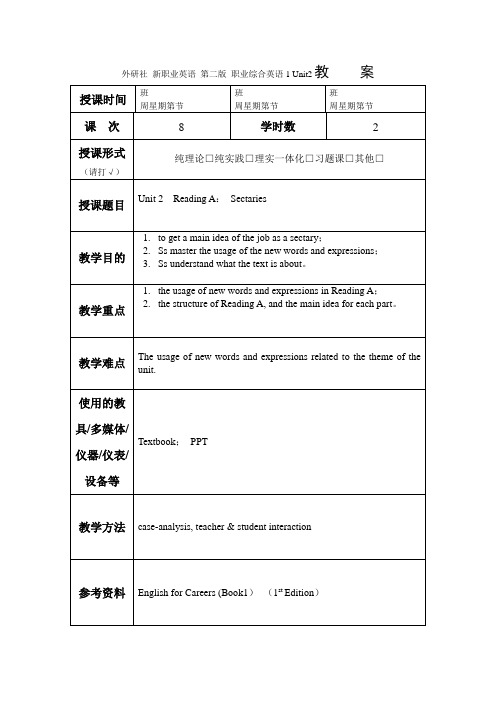
外研社新职业英语第二版职业综合英语1 Unit2教案
说明:1。
课程教案应按授课次数编写;重复班授课不再另行编写教案。
2.合班课的“授课时间"可以集中填写.
外研社新职业英语第二版职业综合英语1 Unit2教案
说明:1.课程教案应按授课次数编写;重复班授课不再另行编写教案。
2。
合班课的“授课时间”可
外研社新职业英语第二版职业综合英语1 Unit2教案
说明:1。
课程教案应按授课次数编写;重复班授课不再另行编写教案。
2.合班课的“授课时间"可以集中填写。
外研社新职业英语第二版职业综合英语1 Unit2教案
说明:1.课程教案应按授课次数编写;重复班授课不再另行编写教案.
2。
合班课的“授课时间"可以集中填写.。
初中英语时态教案
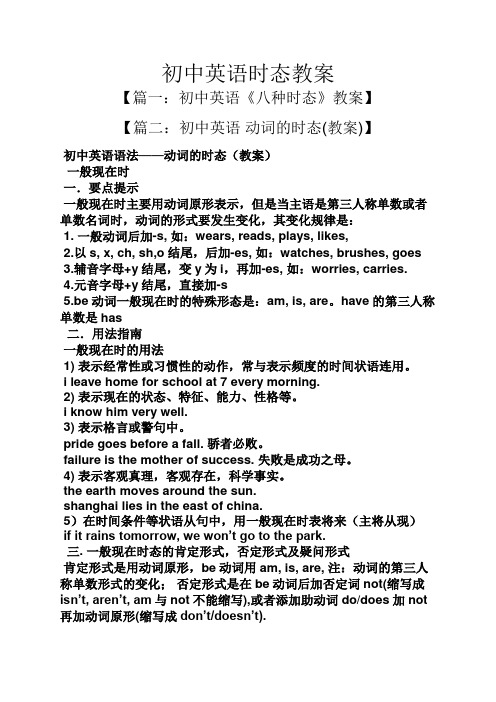
初中英语时态教案【篇一:初中英语《八种时态》教案】【篇二:初中英语动词的时态(教案)】初中英语语法——动词的时态(教案)一般现在时一.要点提示一般现在时主要用动词原形表示,但是当主语是第三人称单数或者单数名词时,动词的形式要发生变化,其变化规律是:1. 一般动词后加-s, 如:wears, reads, plays, likes,2.以s, x, ch, sh,o结尾,后加-es, 如:watches, brushes, goes3.辅音字母+y结尾,变y为i,再加-es, 如:worries, carries.4.元音字母+y结尾,直接加-s5.be动词一般现在时的特殊形态是:am, is, are。
have的第三人称单数是has二.用法指南一般现在时的用法1) 表示经常性或习惯性的动作,常与表示频度的时间状语连用。
i leave home for school at 7 every morning.2) 表示现在的状态、特征、能力、性格等。
i know him very well.3) 表示格言或警句中。
pride goes before a fall. 骄者必败。
failure is the mother of success. 失败是成功之母。
4) 表示客观真理,客观存在,科学事实。
the earth moves around the sun.shanghai lies in the east of china.5)在时间条件等状语从句中,用一般现在时表将来(主将从现)if it rains tomorrow, we won’t go to the park.三. 一般现在时态的肯定形式,否定形式及疑问形式肯定形式是用动词原形,be动词用am, is, are, 注:动词的第三人称单数形式的变化;否定形式是在be动词后加否定词not(缩写成isn’t, aren’t, am与not不能缩写),或者添加助动词do/does加not 再加动词原形(缩写成don’t/doesn’t).疑问形式是把be动词或助动词do/does提置句首, 动词还原,句末问号,人称上第一人称变第二人称,第二人称变第一人称或不变,第三人称不变。
(完整版)动词的时态和语态教案
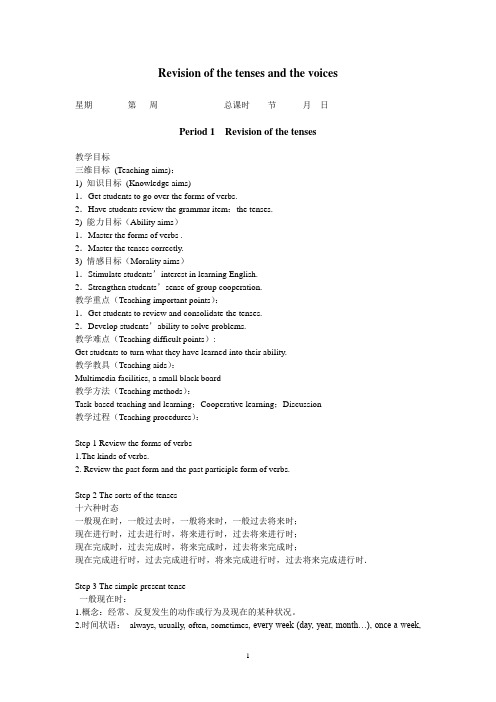
Revision of the tenses and the voices星期第周总课时节月日Period 1 Revision of the tenses教学目标三维目标(Teaching aims):1) 知识目标(Knowledge aims)1.Get students to go over the forms of verbs.2.Have students review the grammar item:the tenses.2) 能力目标(Ability aims)1.Master the forms of verbs .2.Master the tenses correctly.3) 情感目标(Morality aims)1.Stimulate students’interest in learning English.2.Strengthen students’sense of group cooperation.教学重点(Teaching important points):1.Get students to review and consolidate the tenses.2.Develop students’ability to solve problems.教学难点(Teaching difficult points):Get students to turn what they have learned into their ability.教学教具(Teaching aids):Multimedia facilities, a small black board教学方法(Teaching methods):Task-based teaching and learning;Cooperative learning;Discussion教学过程(Teaching procedures):Step 1 Review the forms of verbs1.The kinds of verbs.2. Review the past form and the past participle form of verbs.Step 2 The sorts of the tenses十六种时态一般现在时,一般过去时,一般将来时,一般过去将来时;现在进行时,过去进行时,将来进行时,过去将来进行时;现在完成时,过去完成时,将来完成时,过去将来完成时;现在完成进行时,过去完成进行时,将来完成进行时,过去将来完成进行时.Step 3 The simple present tense一般现在时:1.概念:经常、反复发生的动作或行为及现在的某种状况。
revised
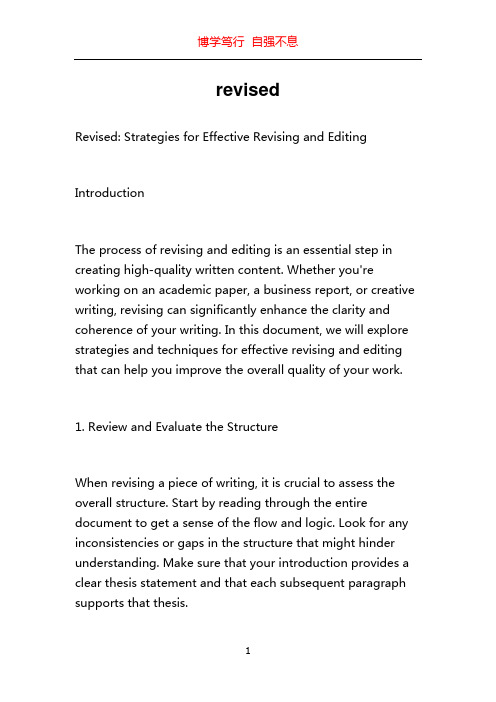
revisedRevised: Strategies for Effective Revising and EditingIntroductionThe process of revising and editing is an essential step in creating high-quality written content. Whether you're working on an academic paper, a business report, or creative writing, revising can significantly enhance the clarity and coherence of your writing. In this document, we will explore strategies and techniques for effective revising and editing that can help you improve the overall quality of your work.1. Review and Evaluate the StructureWhen revising a piece of writing, it is crucial to assess the overall structure. Start by reading through the entire document to get a sense of the flow and logic. Look for any inconsistencies or gaps in the structure that might hinder understanding. Make sure that your introduction provides a clear thesis statement and that each subsequent paragraph supports that thesis.2. Check for Clarity and CoherenceWhile revising, pay close attention to the clarity and coherence of your writing. Ensure that each sentence is easy to understand and contributes to the overall meaning of the text. Eliminate any unnecessary jargon or overly complex language. Invest time in rephrasing and clarifying unclear statements to ensure that your ideas are effectively conveyed to the reader.3. Edit for Grammar and SpellingTo create a polished piece, you need to carefully edit for grammar and spelling errors. Utilize grammar checking tools or proofreading software to help identify any mistakes, but remember not to solely rely on technology. Thoroughly review each sentence, paying attention to subject-verb agreement, verb tenses, and punctuation. Correct any spelling errors and ensure consistency in spelling and capitalization throughout the document.4. Enhance Sentence StructureA well-written piece of material depends on effective sentence structure. During the revision process, consider sentence length, syntax, and variety. Avoid excessively long sentences that might confuse the reader, and vary the structure to maintain the reader's engagement. Incorporate different sentence types, such as simple, compound, and complex sentences, to add depth and nuance to your writing.5. Evaluate and Edit for ContentContent evaluation is vital during the revision process. Assess the relevance and accuracy of the information included in your document. Ensure that your arguments or points are supported with valid evidence and examples. Remove any irrelevant or redundant information, and add any necessary details to strengthen your arguments. Pay attention to logical fallacies or inconsistencies in your reasoning and address them accordingly.6. Seek FeedbackRevising your work in isolation can be challenging, so it's helpful to seek feedback from others. Share your document with trusted peers, colleagues, or instructors to get different perspectives. Consider their suggestions for improvementand apply them accordingly, but also use your judgment to determine which suggestions align with your original intention.7. Read Aloud and ProofreadReading your work aloud can help you identify any grammatical mistakes, awkward phrasing, or other issues that may not be apparent from silent reading alone. Additionally, proofread your document thoroughly multiple times. Take breaks between proofreading sessions to maintain focus and attentiveness. Consider printing the document and proofreading a hard copy to catch errors that might have been missed on a digital screen.ConclusionEffective revising and editing are integral parts of the writing process. By following the strategies outlined in this document, you can improve the structure, clarity, and overall quality of your writing. Remember to take the time to review and evaluate the structure, check for clarity and coherence, edit for grammar and spelling, enhance sentence structure, evaluate and edit for content, seek feedback, and read aloud and proofread. These strategies will help you refine your workto ensure that your message is communicated effectively to your audience.。
Revision: tenses
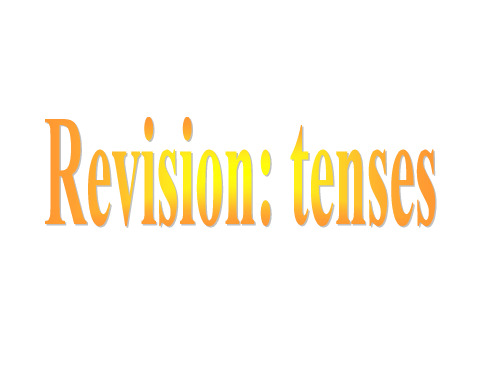
四、利用上下文语意确定时态的原则
4. –Hi! Lin Tao. I didn’t see you at the party. --Oh, I ready for the maths exam. A. am getting B. was getting C. got D. have got [析] 4. B。此例由didn’t, at the party推断出应用过去进 行时。
afternoon. 3. It’s three years since he joined the League (入团). 4. Please let me know as soon as he comes back(他一回来). 5. I was just falling asleep (正要入睡) when there was a loud knock at
三、根据上下文已有时态信息点确定时态的原则
3. –When this kind of computer ? --Last year.
A. did; use B. was; used C. is; used D. are; used [析] 3. B。此例由下句的时间状语推断出一般过去时态,并 且要考虑到被动语态。
goes (go) around the sun.
Go
B) 根据汉语意思,完成下列句子: 1. When I got to the cinema, the film had already been on (电影已
经开始了二十分钟了). 2.There is going to be/will be (有一场音乐会) a concert tomorrow
--No. They’re still in his bedroom.
- 1、下载文档前请自行甄别文档内容的完整性,平台不提供额外的编辑、内容补充、找答案等附加服务。
- 2、"仅部分预览"的文档,不可在线预览部分如存在完整性等问题,可反馈申请退款(可完整预览的文档不适用该条件!)。
- 3、如文档侵犯您的权益,请联系客服反馈,我们会尽快为您处理(人工客服工作时间:9:00-18:30)。
What happened yesterday?
Yesterday _____Friday.It ____sunny.Snake was was were and I went to the mountain.There_____many ____ saw trees and flowers.I _____ a peach tree .So I climbed ate _______onto the tree and____the peaches. flew Suddenly,Crane _____ and____into my face.I fell came off the tree and my leg was broken.Crane really taught ______me a lesson.
Finish the sentences .
1、On the first day Amy went to the zoo and saw _______________________________________ elephants,monkeys,tigers and so on. 2、On the second day she went to the West Lake ________________________________________ and rowed a boat.
I am going to read a book. Food
Chose one from the two choices.(二选一)
1、 What’s he doing ? He’s __________(read/reading) books. reading 2、 Mike often __________(watches/watch) watches TV in the evening. went 3、 I _______(went /go ) to a park yesterday . is going to watch 4、 She _______________(is going to watch/ watched) insects in the park next week. 5、 He _______(buy/ bought )a book last weekend bought am 6、 I _____( am /is ) from China . 7、 A young woman ____________( riding a bike is riding a bike /is riding a bike ) on the street.
Finish the sentences .
1、On the first day Amy went to the zoo and saw _______________________________________ elephants,monkeys,tigers and so on. 2、On the second day she ________________________________________
P:Oh,I’m sorry to hear that…
What happened(发生) yesterday?
Let me tell you!
What happened yesterday? Yesterday was Friday.It was sunny.Snake and I went to the mountain.There were many trees and flowers.I saw a peach tree.So I climbed onto the tree and ate the peaches.Suddenly,Crane(仙鹤) came and flew into my face.I fell off(跌落) the tree and my leg was broken.Crane really taught me a lesson . Read and tick or cross. 1.I saw some peach trees.( ) 2.Snake fell off the tree .( ) 3.Crane flew into my face.( ) 4.I went to the mountain with Snake.( )
Fill in the blanks with proper words.适当形式填空。 read 1.Mary_____(read)English yesterday morning. 2.Tom plays the piano every Saturday.Now he_____ _________.(play). is playing is singing 3.Listen!My aunt____________(sing)in the room. She_________________(have)a music show next Is going to have month. 4.It ___________(be going to) snow. is going to 5.He_____(go) to work by taxi yesterday. went
Do you want to practise Kungfu with me? A M:Sorry,Panda. _____.
C P: _________? M:Oh,yesterday I fell from the mountain and I hurt my leg.You can ask Tiger .
What’s the present?
Keys
F 1.am, going,the,mountain,climb,I,to(.) I am going to climb the mountain. o 2.buy,a present,for,Panda,I,going,to,am(.) I am going to buy a present for Panda. o 3.I,going,give,the ,present,Panda,to,am,to(.) I am going to give the present to Panda. Wow! d 4.Panda,going,is,to,a,read,book (.)
Revision of Tenses
现在进行时 Present Continuous Tense 一般过去时 Past Indefinite Tense 一般将来时 Future Indefinite Tense
胜山镇中心小学 宋巍 Shengshan Town Central Primary School SongWei
不规则动词
go fly is/am sing eat
went flew was sang ate
read read swim swam are were take took make made
Let me make a phone call to Tiger!
(talking )or (walking)?
Dear Sarah, I went to Hangzhou with my parents on my holiday We went by plane . Hangzhou was so beautiful . On the first day I went to the zoo . There were many animals in the zoo . We saw elephants,monkeys , tigers and so on . On the second day we went to the West Lake. I rowed a boat . On the third day we went shopping . I bought a present for you . I also bought many presents for my grandparents . Tomorrow we are going to be back home ! Love Amy
study-studied worry-_______ worried carry-________ carried
1、一般在动词末尾加-ed . 2.结尾是e加d . 3、末尾只有一个辅音字母的重读闭音节, 应双写末尾的辅音字母,再加-ed . 4. 以“辅音字母+y”结尾的,变y为i, 再加-ed
What happened ?
was went saw climbed ate flew was were
came
taught
Can you find rules?
(你能找出规则动词变过去式形式的规律吗?)
Tips
open-opened cook-_______ cooked cleaned clean-_______ failed fail-______
use-used hope-________ hoped phone-_______ phoned lived live-_________
shipped ship-________ stop-________ stopped planned plan-________ tripped trip-________
3、On the third day she _______________________.
4、On the fourth day she_______________________ .
Dear Sarah, I went to Hangzhou with my parents on my holiday We went by plane . Hangzhou was so beautiful . On the first day I went to the zoo . There were many animals in the zoo . We saw elephants,monkeys , tigers and so on . On the second day we went to the West Lake. I rowed a boat . On the third day we went shopping . I bought a present for you . I also bought many presents for my grandparents . Tomorrow we are going to be back home ! Love Amy
